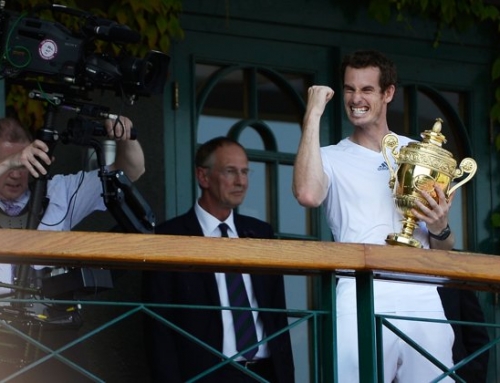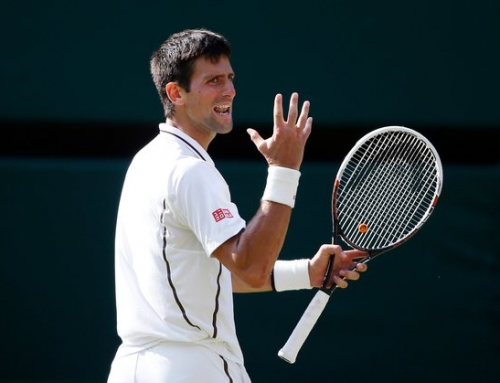Andy Murray, critics will say, lost because his serve percentage was 52% while Andy Roddick’s serve percentage was 75%. But that doesn’t tell the entire story.
Roddick, for as big as he serves, is remarkably consistent. He has average a little over 70% for the entire tournament. He has not served lower than 70% in any of his matches.
Murray generally serves between 55% and 65%.
One odd statistic was the number of aces by Murray. He served 25 aces, which was more than Andy Roddick. This isn’t so unusual because Murray had, save an odd match here or there, served just under 20 aces a match.
Murray had a few problems. One was his passing shots. Because Andy Roddick attacked more than usual, Murray had to pass more than usual. Roddick approached primarily to the Murray backhand. Murray primarily passed crosscourt, sometimes netting the shot. Roddick seemed to know that Murray prefers the crosscourt pass and closed into net even tighter than usual. One would imagine Murray might have tried passing down the line, but he didn’t do this.
Murray also had a few groundstrokes that went awry. This happens to everyone, but it was very Federer-like (at least back when he was struggling). Murray inexplicably missed a few shots in a neutral rally. Indeed, were Murray a bit steadier off the ground, his poor serving percentage wouldn’t have mattered so much.
Much of Murray’s problems occurred in the third set. Murray had broken Roddick early in the second set, and took the set with a break. Murray went up 0-40 on Roddick’s serve, and Roddick managed to scrape out a victory in that game. Had Murray broken there, Murray’s confidence would likely have soared, and Roddick would have struggled to win. Instead, Roddick broke, and appeared to be cruising to a third set victory.
But again, Murray broke Roddick. Thus, despite Murray’s poor first serve percentage and Roddick’s excellent first serve percentage, it boiled down to a few points here and there. In particular, look at the third set tiebreak. This was a close tiebreak that went Roddick’s way. Indeed, statistically, Roddick has had a great tiebreak record.
The fourth set also came down to a tiebreak, and that set was also close. Now, perhaps if Murray had been serving well, Roddick would not have had looks to break his serve and Murray might have won by breaking Roddick’s serve. That is a possibility. But in the end, the serve percentage doesn’t tell the entire story mostly because Murray was able to take games off Roddick.
Roddick, for his part, played a smart match. Already he was serving very consistently, but Murray didn’t expect Roddick to mix it up so much. In particular, Roddick came to the net 75 times. Meanwhile, Murray retreated far behind the baseline as he does when he feels tight. Although Murray didn’t pass particularly well, he was hitting his down the line forehand and backhand well. Both Murray and Roddick like to hit these short down the line shots where the ball barely clears the service line. I think the idea is, by the time the ball reaches the baseline, it becomes really hard to hit a passing shot. One must hit up.
Ultimately, the match turned on a few key points, and was pretty tightly played. Was it a good match? Well, there weren’t so many exciting points, and so the crowd had a hard time getting into it. They were perhaps more tense than usual hoping Murray would get fired up.
The common criticism is that Murray gets a bit passive. If Murray dominates someone, it’s typically someone that can’t hurt him, like Juan Carlos Ferrero. Because Murray doesn’t go out trying to hit a ton, and often mixes his slices with his drives, he allows opponents who hit hard to occasionally dictate to him. Roddick, for his part, doesn’t try to blast a player off the court.
Against, Murray, Roddick also mixed up his shots, coming in sometimes, hitting softer sometimes, hitting harder sometimes. This variety kept Murray off-balance, and seemed to bother him as much as Murray seems to bother others.
At times, Murray was hitting well, especially his down-the-line backhand. But when he plays more aggressively, he also misses more. He was bothered by a code warning when umpire Pascal Maria heard what he thought was an obscenity. Murray said “Andy, hit the pass” and Maria apparently interpreted it as something else. This irritated Murray and generally, when Murray is unhappy, he doesn’t play his best tennis. And when he’s struggling a bit, like he did today, he doesn’t usually get out of it easily. Give credit to Roddick for playing the big points better and for not making errors at bad times.
OK, so does Roddick stand a chance? Recall he served extremely well, and still barely won two tiebreaks to beat Murray.
Federer, on the other hand, just beat Haas in three sets. Like Roddick, he served at 75%. He won a gaudy 89% of points on first serve and 81% on second serves. Meanwhile, Roddick won 77% of his first serves, but only a shade over 50% on his second serves. Indeed, Federer has been getting tougher and tougher on his first and second serve win percentage as the tournamen has proceeded. If Roddick is going to win, he needs to get a bead on Federer’s second serve and hope Federer serves around 60%. If Federer serves anything like today, Roddick won’t have a chance.
Roddick’s best chance is to win in tiebreaks. Roddick has a great tiebreak record this year. He’s unlikely to beat Federer by simply outhitting him. Roddick is likely to apply similar tactics as he did with Murray, that is, mixing stuff up. Roddick simply lacks enough weapons to hurt Federer. He is, however, steady enough to play long rallies with Federer. Federer, however, will clearly look to shorten the points and apply pressure.
One can hope that Roddick will play as sharply as he did today so the match can be interesting. The crowd will likely back Roger Federer who has become their adopted son, as they hope to witness history, the breaking of Pete Sampras’s record.
The key for Roddick is how well Federer sees his serve. Federer struggled a bit with Haas’s serve through the match, but did just well enough in two games to make the difference. Federer feels very confident that when the opportunities present themselves, he can take advantage. So far, though, Roddick has managed to win some tight matches, including his last two. This should give him some confidence. But in the end, will it be enough?







![[Wimbledon, QF] Murray scraps out 5-set win over Verdasco to reach semifinals](https://www.essentialtennis.com/wp-content/uploads/2013/07/20130703murray-500x383.jpg)